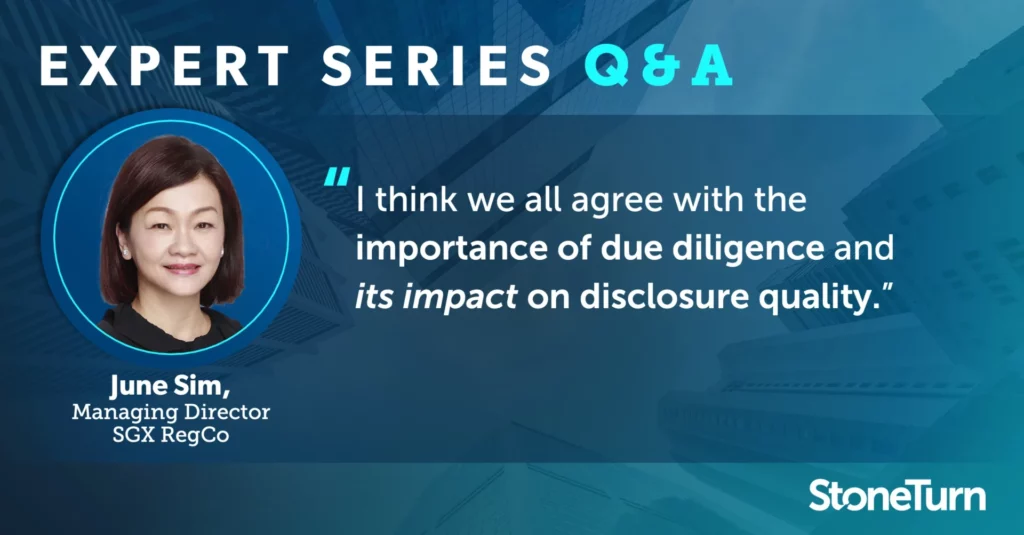Please tell us a bit about SGX RegCo and your role?
SGX RegCo is a subsidiary of the SGX Group formed to administer the frontline regulatory functions on behalf of SGX Group. We operate as an independent entity with a separate board of directors and CEO.
We are committed to promoting a fair, orderly and transparent market as well as fostering trust among our stakeholders, supporting the continuing development of our capital market.
Can you share a bit about your career journey? What led you to your current role?
I embarked on a regulatory career and started from ground zero. I gained experience progressively through reviewing corporate announcements, financial statements and shareholders circulars on mergers, acquisitions, disposals and schemes of arrangements.
I started as a junior officer, progressing to a team lead before I was asked to step out of my comfort zone to oversee the inception of Catalist, when I stepped up as the Head of Catalist Regulation. I had what then appeared to me to be the Herculean Task of ensuring the expedient transfer to ALL SESDAQ Companies to the Catalist Board within 2 years by 2010. Working together with my business colleagues and the senior management, we successfully executed the smooth transition of all SESDAQ companies to a sponsorship regime that we are now familiar with. We also onboarded the first batch of Full and Continuing Sponsors in 2008. This was no easy feat, as we had to make sure that our initial batch of Sponsors met our strict standards in terms of experience and track record. I was at the forefront leading a small team of 3 officers that oversee Catalist issues. We had to start from a clean slate, developing inspection modules, administering the sponsor registration process and forms (what you see in the Catalist rule book today) and writing an entirely new set of rules for Catalist. We were only able to do so due to our experience in regulating Main board and SESDAQ companies. By then, I have had many years of regulatory experience, including in Initial Public Offerings (IPOs). I am especially thankful to my ex-bosses Ms Yeo Lian Sim, Mr Gan Seow Ann and Mr Lawrence Wong as well as Mr Hsieh Fu Hua, SGX’s then CEO for putting me through this rite of passage.
Catalist was a defining moment for me. A restructuring was undertaken in 2015 leading to the formation of what all issuers know now as the Listing Compliance unit which monitors the regulatory compliance of all SGX listed companies. I was promoted to Head, Listing Compliance given my successful stint as Head of Catalist Regulation, and now tasked with the responsibility of regulating all SGX listed issuers.
What do you like and excites you about your role?
What keeps me going is the mental stimulus from the multi-faceted work we do. From responding to multiple stakeholders (such as media commentators, shareholders, professional bodies, intermediaries or even investor bodies such as SIAS) to grappling with issues that crop up at our listed issuers, the role requires a great amount of problem-solving skills. Each listed issuer has a different board (in other words, stewards with different standing, experience and integrity), so I am constantly learning, and have to always be vigilant and responsive.
At the same time, I have to also be open to new approaches and learn from successes and failures. In the regulatory space, there is almost little or no room for failure so this can be daunting.
My mind is constantly engaged, and it is not uncommon to have disrupted sleeps as well as interrupted holidays. It is almost difficult (at least for me it is almost impossible) to not read emails. Otherwise, I would suffer the consequences of many unread emails when I return to work. As a career regulator, some of the issues that emerge also need to be handled expeditiously. Dealing with non-compliant companies, receiving multiple pressures from stakeholders and being judged based on our action or inaction keep me up at night.
Can you share what you and/or SGX RegCo is doing to overcome these challenges?
The fundamental roles of a regulator have not really changed over time – it remains to provide a fair, orderly and transparent market. Shareholders are becoming increasingly active as corporate stewards. Also, the rise of social media, seen as an independent voice, has played a significant role in shaping market perception and driving investors’ sentiment. the way in which we do our work therefore has to change along with market dynamics, emerging threats, new regulatory challenges and an evolving investor profile.
Technology has posed both opportunities and challenges for regulators globally.
On the one hand, Regulatory Technology, or regtech, has enabled certain processes to be automated, thereby enabling resources to be devoted to areas which present higher regulatory risks. One brainchild of mine was the “Automated Clearance Regime” which enabled corporate action of lower regulatory risks such as bonus issues, change of names and employee-share plans to be approved within a day subject to “SGX Fast Track Program,” where issuers received prioritized clearance for corporate action submissions for companies with good compliance track record . Other initiatives include publication of inspection findings and case studies to promote good standards and practices for Sponsors. Recently, we also leveraged artificial intelligence (AI) technology to automate the analysis of financial statements and annual reports in a bid to pre-emptively identify concerns.
On the other hand, technology is an enabler for cyber-attacks and sophisticated market manipulation. This is exacerbated by the globalisation and digital transformation of financial markets. Being a key part of the financial infrastructure of Singapore, SGX RegCo closely monitors developments in technology and works together with the market community in areas such as digitalization and cybersecurity. SGX RegCo also has a dedicated surveillance team to monitor trading activities.
In recent years, sustainability has become a key area of focus. The need for sustainability reporting and investor appetite for more sustainability related disclosures, are here to stay. We have seen increased adoption of standards like the GRI (Global Reporting Initiative), TCFD (Task Force on Climate-related Financial Disclosures), ESRS (European Sustainability Reporting Standards), and most recently, the ISSB (International Sustainability Standards Board) standards. The ISSB has just announced its new standards (IFRS S1 and IFRS S2) on 26 June 2023 and SGX RegCo intends to incorporate the standards into our Listing Rules.
Our support of this movement toward sustainability doesn’t stop there. Just to name a few, we have:
a. Established the Sustainability Reporting Advisory Committee in conjunction with ACRA, to advise on the Singapore sustainability roadmap;
b. Launched SGX ESGenome, a digital disclosure portal for companies to report Environmental, Social and Governance (ESG) data;
c. Launched the SGX Sustainable Fixed Income initiative to recognise fixed income securities listed on SGX-ST that meet certain green, social or sustainability standards;
d. Listed the first retail green bonds in FY2023.
Monetary Authority of Singapore issued SFA 04-N21 on Business Conduct Requirements for Corporate Finance Adviser in February 2023. Specifically, Part 2 of the Notice sets out certain due diligence requirements which is consistent with the guidelines issued by the Association of Banks of Singapore. Can you elaborate more about the due diligence requirements, when it is applicable, and why it is important?
I think we all agree with the importance of due diligence and its impact on disclosure quality.
Before the MAS notice, Corporate Finance (CF) Advisers were only subject to general due diligence conduct requirements under the Securities and Futures Act, with regard to disclosures in the prospectus. This was augmented by the guidelines issued by the Association of the Banks of Singapore (ABS), however such guidelines are not enforceable by law. The MAS notice thus formalises the regulatory requirements on the conduct of due diligence by CF Advisers.
The actual due diligence requirements under Part 2 of the MAS notice are broadly similar to the principles of the ABS guidelines, with the latter providing more specific application guidance. There are however a couple of extensions:
1) The first being that reverse-takeovers are explicitly covered under these due diligence requirements; and
2) The second being that the senior management of the CF Adviser, are required to review and approve the material conclusions of the CF Adviser working level team, as well as the bases at arriving at such conclusions.
In terms of when the due diligence requirements must be completed, they should be completed prior to the submission of the prospectus to SGX-ST / MAS, unless by virtue of their nature it can only be performed after. However, this does not mean that the due diligence process stops there. The CF Advisers still have the obligation to monitor for any material developments related to the transaction and assess the impact of such information as and when the need arises.
There have been opposing views on short sellers. What are yours?
Short selling generally plays an important role in markets as it allows for more efficient pricing of securities and facilitates hedging activities. However, when investors intend to make a short sale, they should have arrangements in place to avoid settlement failures. SGX Group will levy penalties for settlement failures under our Clearing Rules.
SGX Group also frowns on any market misconduct including abusive short-selling, such as selling accompanied by false rumours designed to encourage others to sell. Such activities may be illegal and constitutes an offence under the Securities and Futures Act.
What would be on your wish list (in relation to your role or personally)?
My wish is for all SGX listed issuers and their management to always bear in mind that SGX RegCo is a party that is working with them to create a better investment landscape for investors. While you may think that it is at times expedient to disregard the listing rules, know that the rules are designed with a purpose and for the ultimate benefit of various stakeholders, including the issuer itself.
That said, when rules present practical difficulties we have a dedicated Listing Policy and Product Admission unit monitoring changes in the regulatory landscape as well as benchmarking our practices with other established jurisdictions. This is to ensure that our listing rules remain relevant, fit-for-purpose and suit the twin objectives of maintaining trust and supporting market development. We value feedback from our market community, both in the crafting of new rules and the enhancement of existing rules.
Finally, do you have any advice for those who aspire to build a career in your field/SGX RegCo?
I think the most important thing is to have a strong sense of integrity, objectivity, and adaptability. All these traits will help to make balanced decisions that can protect market participants, while promoting market efficiency and growth. Of course, knowledge and regulatory expertise are important, but these are technical skills that can be built over time. You have to tailor your communication skills and approach to the specific dynamics of the board of listed issuers. You need a character of steel to deal with rogue and errant directors, and unyielding dedication to navigate the challenges. I always tell myself that negative criticism is part of anyone’s professional life and it does not define my values or abilities but I did what I could to leave no stone unturned.
I would like to thank StoneTurn Singapore for the opportunity to share my experience and aspirations.







